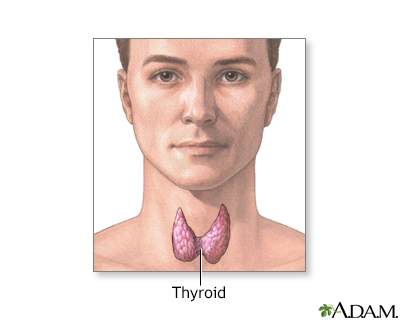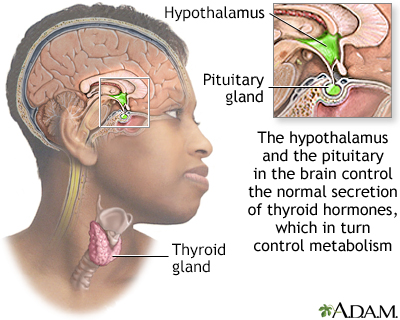Pregnancy SmartSiteTM
Thyrotoxicosis; Overactive thyroid; Graves disease - hyperthyroidism; Thyroiditis - hyperthyroidism; Toxic goiter - hyperthyroidism; Thyroid nodules - hyperthyroidism; Thyroid hormone - hyperthyroidism DefinitionHyperthyroidism is a condition in which the thyroid gland makes too much thyroid hormone. The condition is often called overactive thyroid. CausesThe thyroid gland is an important organ of the endocrine system. It is located at the front of the neck just above where your collarbones meet. The gland makes the hormones that control the way every cell in the body uses energy. This process is called metabolism.  Many diseases and conditions can cause hyperthyroidism, including:
 SymptomsCommon symptoms include:
 Other symptoms that can occur with this condition:
 Exams and TestsThe health care provider will do a physical exam. The exam may find the following:
Blood tests are also ordered to measure your thyroid hormones (free thyroxine or free T4 and triiodothyronine or T3) and a pituitary hormone that regulates the thyroid gland (thyroid stimulating hormone or TSH). You may also have blood tests to check:
Imaging tests of the thyroid may also be needed, including: TreatmentTreatment depends on the cause and severity of symptoms. Hyperthyroidism is usually treated with one or more of the following:
If your thyroid is removed with surgery or destroyed with radioactive iodine, you must take thyroid hormone replacement pills for the rest of your life. Medicines called beta-blockers may be prescribed to treat symptoms such as fast heart rate, tremor, sweating, and anxiety until the hyperthyroidism can be controlled. Outlook (Prognosis)Hyperthyroidism is treatable. Some causes, such as thyroiditis, may go away without treatment. Hyperthyroidism caused by Graves disease usually gets worse over time. It has many complications, some of which are severe and affect quality of life. Possible ComplicationsThyroid crisis (also called thyroid storm) is a sudden worsening of hyperthyroidism symptoms that may occur with infection or stress. Fever, decreased alertness, and abdominal pain may occur. People need to be treated in the hospital. Other complications of hyperthyroidism include:
Surgery-related complications, including:
Tobacco use may make some complications of hyperthyroidism worse. When to Contact a Medical ProfessionalContact your provider if you have symptoms of hyperthyroidism. Go to an emergency room or call 911 or the local emergency number if you have:
Contact your provider if you are being treated for hyperthyroidism and you develop symptoms of underactive thyroid, including:
ReferencesHollenberg A, Wiersinga W, Bartalena L, Feldt-Rasmussen U. Hyperthyroid disorders. In: Melmed S, Auchus RJ, Goldfine AB, Rosen CJ, Kopp PA, eds. Williams Textbook of Endocrinology. 15th ed. Philadelphia, PA: Elsevier; 2025:chap 10. Pearce EN, Hollenberg AN. Thyroid. In: Goldman L, Cooney KA, eds. Goldman-Cecil Medicine. 27th ed. Philadelphia, PA: Elsevier; 2024:chap 207. Ross DS, Burch HB, Cooper DS, et al. 2016 American Thyroid Association guidelines for diagnosis and management of hyperthyroidism and other causes of thyrotoxicosis. Thyroid. 2016;26(10):1343-1421. PMID: 27521067 pubmed.ncbi.nlm.nih.gov/27521067/. | |
| |
Review Date: 7/21/2024 Reviewed By: Sandeep K. Dhaliwal, MD, board-certified in Diabetes, Endocrinology, and Metabolism, Springfield, VA. Also reviewed by David C. Dugdale, MD, Medical Director, Brenda Conaway, Editorial Director, and the A.D.A.M. Editorial team. The information provided herein should not be used during any medical emergency or for the diagnosis or treatment of any medical condition. A licensed medical professional should be consulted for diagnosis and treatment of any and all medical conditions. Links to other sites are provided for information only -- they do not constitute endorsements of those other sites. No warranty of any kind, either expressed or implied, is made as to the accuracy, reliability, timeliness, or correctness of any translations made by a third-party service of the information provided herein into any other language. © 1997- A.D.A.M., a business unit of Ebix, Inc. Any duplication or distribution of the information contained herein is strictly prohibited. | |

 Endocrine glands
Endocrine glands Goiter
Goiter Brain-thyroid link
Brain-thyroid link Thyroid gland
Thyroid gland
